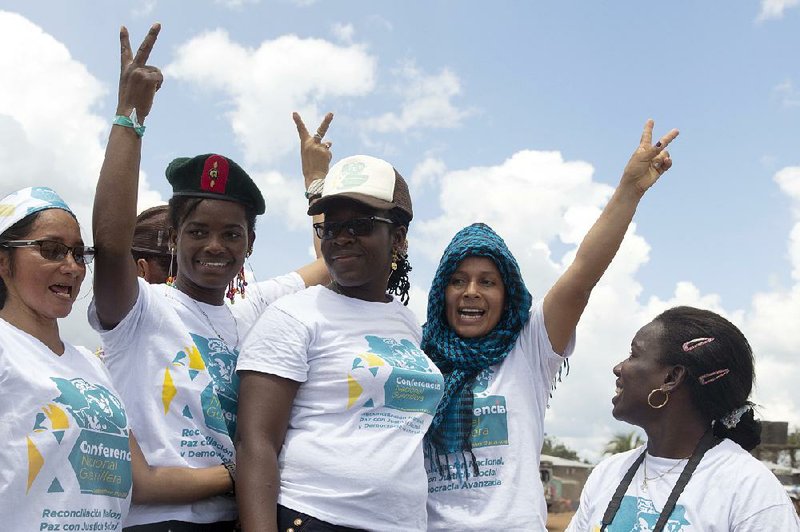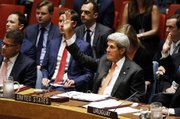Colombia rebels approve peace accord
YARI PLAINS, Colombia — Leaders of the Revolutionary Armed Forces of Colombia have given their unanimous support to a peace agreement reached last month with the government.
The announcement capped off a week of deliberations on a remote savannah in southern Colombia in which the guerrillas attempted to present themselves in a new light to Colombians who blame them for decades of bloody violence.
“The war is over,” rebel leader Ivan Marquez said at a closing news conference.
President Juan Manuel Santos and rebel leader Rodrigo Echeverri, also known as Timochenko, are expected to sign the agreement Monday in the Caribbean city of Cartagena in an event that will be attended by more than a dozen regional heads of state, U.N. Secretary General Ban Ki-moon and U.S. Secretary of State John Kerry.
Echeverri, speaking at a closing ceremony Friday, made a special appeal to the millions of victims of the half-century conflict, saying that in addition to an end of hostilities, they’ll benefit from learning the truth about what happened to their loved ones.
“Finally we’ll have a second opportunity on Earth,” he said.
U.S. pledges $133M to aid S. Sudanese
KAMPALA, Uganda — The State Department says the United States is pledging nearly $133 million in additional humanitarian assistance to South Sudan’s refugees and internally displaced people.
The aid comes despite discussions over whether the U.S. should cut its aid to the country trying to recover from civil war.
U.S. Secretary of State John Kerry last month said U.S. humanitarian assistance to South Sudan will not continue forever if its leaders “are not prepared to do what’s necessary for their people.”
The United States has given nearly $1.9 billion in aid since the civil war started.
Bodies at 162 in migrants’ sea disaster
ROSETTA, Egypt — The bodies of 162 people had been pulled from the waters off the Egyptian coast by Friday, two days after a boat carrying hundreds of migrants capsized in the Mediterranean while attempting to head to Europe.
Dozens more are feared dead, said Mohammed Sultan, the governor of Beheira, who provided the latest figures. He also said the search operation is still ongoing. Many of them are believed to be children and women who were unable to swim away when the boat sank.
Wahdan el-Sayyed, the spokesman of the Nile Delta province of Beheira, said the search operation was ongoing.
Authorities have struggled to give accurate figures for the number of people on board the capsized vessel. The U.N. Refugee Agency estimated that the boat was packed with some 450 people, while the state-run Middle East News Agency said earlier that the number might be as high as 600.
The boat was located nearly 12 kilometers from the Nile Delta port city of Rosetta when it sank. Survivors said that overcrowding caused the boat to capsize.
Egyptian officials said that more than 160 people were rescued and that the majority are Egyptians, while the others are Sudanese and other nationalities, including Somalians and Eritreans.
U.N. calls to implement nuke test ban
UNITED NATIONS — With U.S. Secretary of State John Kerry invoking North Korea’s latest nuclear explosion as a “reckless act of provocation,” the U.N. Security Council on Friday approved a resolution urging quick global implementation of a treaty that would ban tests of such weapons.
Kerry said universal adoption of the Comprehensive Test Ban Treaty would result in a “safer, more secure, and more peaceful planet,” as the United States and 18 other council members approved the resolution, with none opposed and Egypt abstaining.
The U.S., along with China, Egypt, India, Iran, Israel, North Korea and Pakistan, remains one of the holdouts among the 44 countries that are designated “nuclear capable” that still need to ratify the treaty for it to enter into force.
Until those eight countries embrace the treaty it is supposed to administer, the U.N.’s Test Ban Organization cannot go on site to inspect for tests.
A Section on 09/24/2016

